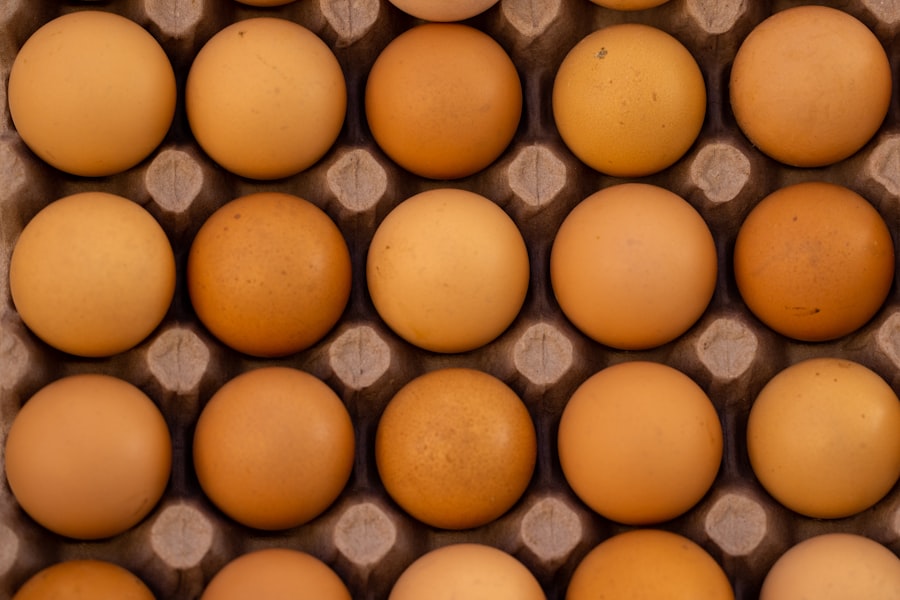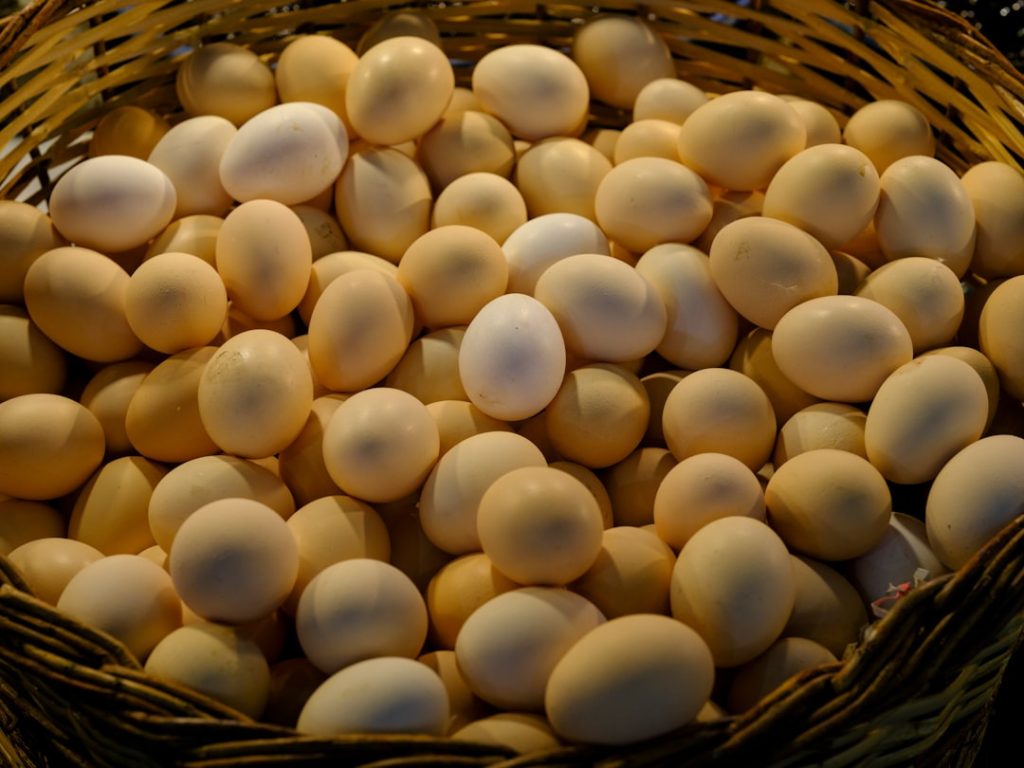Fresh eggs are a common household ingredient used in various culinary applications. They are rich in essential nutrients, including protein, vitamins, and minerals, making them a nutritious addition to meals. When purchasing fresh eggs, it is important to consider factors such as proper storage, freshness determination, and spoilage recognition.
Eggs come in different sizes and colors, depending on the chicken breed that produced them. Colors can range from white to brown, and even speckled, while sizes vary from small to extra-large. When selecting eggs, it is advisable to choose those that are clean and free from cracks or damage.
Proper storage is crucial for maintaining egg freshness and quality. By following appropriate storage methods, consumers can extend the shelf life of eggs and ensure their safety for consumption. This article will explore best practices for storing fresh eggs, determining their freshness, identifying signs of spoilage, and prolonging their shelf life.
Additionally, it will provide information on utilizing fresh eggs in cooking and baking to maximize their versatility in the kitchen.
Table of Contents
Key Takeaways
- Fresh eggs are a versatile and nutritious ingredient that can be used in a variety of dishes.
- Store fresh eggs in the refrigerator to maintain their freshness and quality.
- Determine the freshness of eggs by performing a simple float test or by checking the expiration date.
- Signs of spoilage in fresh eggs include a foul odor, unusual color, or slimy texture.
- Extend the shelf life of fresh eggs by refrigerating them and using them within 3-5 weeks of purchase.
Storing Fresh Eggs Properly
The Ideal Storage Location
The best place to store fresh eggs is in the refrigerator, where the temperature is consistently cool. It’s important to keep the eggs in their original carton to protect them from absorbing strong odors from other foods in the refrigerator. The carton also helps to prevent moisture loss from the eggs, which can cause them to spoil more quickly.
Maintaining Humidity and Preventing Moisture Loss
Another important factor in storing fresh eggs is to keep them at a consistent humidity level. Eggs have a natural protective coating called the bloom, which helps to seal the pores in the eggshell and prevent bacteria from entering. To maintain this protective coating, it’s best to store fresh eggs with the pointed end down. This helps to keep the air cell at the larger end of the egg intact and prevents moisture loss.
Using and Storing Fresh Eggs Long-Term
By following these storage practices, you can ensure that your fresh eggs stay at their best quality for as long as possible. When it comes to storing fresh eggs, it’s important to keep in mind that they should be used within a reasonable amount of time. While they can last for several weeks in the refrigerator, it’s best to use them within three to four weeks for optimal freshness. If you have an abundance of fresh eggs, you can also consider freezing them for longer-term storage. By cracking the eggs into a freezer-safe container and labeling them with the date, you can store them in the freezer for up to a year. This is a great option for preserving fresh eggs when you have more than you can use within a few weeks.
Determining the Freshness of Eggs

Determining the freshness of eggs is an important skill for any home cook or baker. Fresh eggs are essential for achieving the best results in your recipes, so it’s crucial to know how to tell if an egg is still good to use. One common method for determining the freshness of an egg is the float test.
To perform this test, simply fill a bowl with water and gently place the egg in it. If the egg sinks to the bottom and lays flat on its side, it is very fresh. If it stands upright at the bottom of the bowl, it is still fresh but should be used soon.
If the egg floats to the surface of the water, it is no longer fresh and should be discarded. Another method for determining the freshness of eggs is by examining the eggshell itself. Fresh eggs have a smooth and clean shell, while older eggs may have a rougher texture or spots on the shell.
Additionally, you can also crack open an egg and examine the yolk and white. Fresh eggs will have a firm yolk that stands up tall and a thick white that doesn’t spread out too much. If the yolk is flat and the white is runny, it’s a sign that the egg is no longer fresh.
It’s important to note that even if an egg is no longer fresh enough for eating on its own, it can still be used in cooking and baking. As long as there are no signs of spoilage, such as a foul odor or unusual color, slightly older eggs can still be used in recipes where they are mixed with other ingredients.
Signs of Spoilage in Fresh Eggs
While fresh eggs can last for several weeks when stored properly, it’s important to be able to recognize signs of spoilage. Spoiled eggs can pose health risks if consumed, so it’s crucial to know when an egg should be discarded. One common sign of spoilage in fresh eggs is a foul odor.
If you notice a strong or unpleasant smell when cracking open an egg, it’s best to discard it immediately. Another sign of spoilage is an unusual color or texture in the egg white or yolk. Fresh egg whites are clear and thick, while yolks are firm and stand up tall.
If you notice any discoloration or unusual texture in the egg contents, it’s best to err on the side of caution and discard the egg. In addition to visual and olfactory signs of spoilage, you can also perform a simple sniff test to determine if an egg is still good to use. Simply crack open the egg and take a whiff—if it smells off or unpleasant, it’s best to discard it.
It’s important to note that spoiled eggs can harbor harmful bacteria such as salmonella, which can cause food poisoning if consumed. To ensure your safety and the safety of others who may consume your culinary creations, it’s crucial to be vigilant about recognizing signs of spoilage in fresh eggs. Another important consideration when it comes to spoilage in fresh eggs is proper handling and storage.
To minimize the risk of spoilage, always wash your hands before and after handling eggs, and store them at a consistent temperature and humidity level in the refrigerator. By following these best practices, you can reduce the risk of spoilage and ensure that your fresh eggs are safe to consume.
Extending the Shelf Life of Fresh Eggs
While fresh eggs can last for several weeks when stored properly in the refrigerator, there are additional methods for extending their shelf life. One effective way to prolong the freshness of eggs is by applying a protective coating to the eggshell. This can be done by rubbing a thin layer of mineral oil or food-grade wax onto the clean eggshell before storing them in the refrigerator.
The protective coating helps to seal the pores in the eggshell and prevent moisture loss, which can extend the shelf life of fresh eggs. Another method for extending the shelf life of fresh eggs is by pickling them. Pickled eggs are a popular snack or appetizer and can be stored in the refrigerator for several months.
To pickle eggs, simply hard-boil them and then submerge them in a mixture of vinegar, water, salt, sugar, and spices. The pickling solution helps to preserve the eggs and gives them a tangy flavor that makes for a delicious addition to salads or charcuterie boards. If you have an abundance of fresh eggs and want to extend their shelf life even further, you can also consider preserving them through water glassing or freezing.
Water glassing involves submerging clean, unwashed eggs in a solution of water glass (sodium silicate) and water, which creates a protective coating around the eggshell and preserves them for several months. Freezing eggs is another option for long-term storage—simply crack them into a freezer-safe container, label them with the date, and store them in the freezer for up to a year. By utilizing these methods for extending the shelf life of fresh eggs, you can make the most of this versatile ingredient and ensure that you always have high-quality eggs on hand for cooking and baking.
Using Fresh Eggs for Cooking and Baking

The Role of Fresh Eggs in Cooking
In cooking, fresh eggs are often used as binders or thickeners in dishes such as meatloaf, meatballs, or casseroles. They can also be used as a coating for breading meats or vegetables before frying or baking. In these applications, fresh eggs help to hold ingredients together and create a cohesive texture in the finished dish.
The Importance of Fresh Eggs in Baking
In baking, fresh eggs play a crucial role in providing structure, leavening, moisture, and richness to baked goods. They help cakes rise, create tender crumb textures in cookies and muffins, and add richness and flavor to custards and puddings. When using fresh eggs in baking recipes, it’s important to follow proper techniques such as bringing them to room temperature before incorporating them into batter or dough.
Handling Fresh Eggs Safely
When using fresh eggs in raw or lightly cooked dishes such as homemade mayonnaise or Caesar salad dressing, it’s important to use pasteurized eggs to minimize the risk of foodborne illness from harmful bacteria such as salmonella. Overall, fresh eggs are an incredibly versatile ingredient that adds nutritional value and flavor complexity to a wide range of dishes. By understanding how they contribute to different types of recipes and how to handle them properly, you can make the most of this essential ingredient in your culinary creations.
Conclusion and Final Thoughts
In conclusion, fresh eggs are a valuable ingredient that adds nutritional value and versatility to countless recipes for cooking and baking. By understanding how to store fresh eggs properly, determine their freshness, recognize signs of spoilage, extend their shelf life, and use them in various types of dishes, you can make the most of this essential ingredient in your kitchen. When it comes to storing fresh eggs properly, it’s important to keep them at a consistent temperature and humidity level in the refrigerator while maintaining their protective coating by storing them with the pointed end down.
By following these best practices for storage, you can ensure that your fresh eggs stay at their best quality for as long as possible. Determining the freshness of eggs is an important skill for any home cook or baker. By performing simple tests such as the float test or examining the eggshell and contents, you can determine if an egg is still good to use in your recipes.
Recognizing signs of spoilage in fresh eggs is crucial for ensuring food safety. By being vigilant about visual and olfactory signs of spoilage and proper handling and storage practices, you can minimize the risk of consuming spoiled eggs. Extending the shelf life of fresh eggs through methods such as applying a protective coating or pickling them allows you to make the most of this versatile ingredient while reducing waste.
Using fresh eggs in cooking and baking requires an understanding of how they contribute to different types of dishes and how to handle them properly for optimal results. Overall, fresh eggs are an essential ingredient that adds nutritional value and flavor complexity to countless recipes for cooking and baking. By following best practices for storing, determining freshness, recognizing spoilage signs, extending shelf life, and using them in various types of dishes, you can make the most of this versatile ingredient in your culinary creations.
If you’re interested in learning more about keeping chickens and ensuring you have a fresh supply of eggs, you may want to check out this article on farmhouse chicken coop design. Creating the right environment for your chickens can help ensure that you have a steady supply of fresh eggs.
FAQs
How long can you keep fresh eggs from chickens?
Fresh eggs from chickens can be kept at room temperature for up to 2 weeks. If refrigerated, they can last for up to 3-5 weeks.
How can you tell if an egg is still fresh?
You can tell if an egg is still fresh by performing the water test. Place the egg in a bowl of water – if it sinks to the bottom and lays flat on its side, it’s fresh. If it stands upright or floats, it’s not fresh.
Can you freeze fresh eggs?
Yes, you can freeze fresh eggs. Crack the eggs into a freezer-safe container, whisk them together, and then freeze. They can be kept frozen for up to 12 months.
Should you wash fresh eggs before storing them?
It is recommended not to wash fresh eggs before storing them, as the protective coating on the eggshell can be removed, making the eggs more susceptible to bacteria. If the eggs are visibly dirty, it’s best to gently dry-clean them with a dry cloth.
How should fresh eggs be stored?
Fresh eggs should be stored in their original carton in the refrigerator, as the carton helps to protect the eggs from absorbing strong odors and flavors from other foods. If you don’t have the original carton, store the eggs in a covered container with the pointed end facing down to help maintain their freshness.
Meet Walter, the feathered-friend fanatic of Florida! Nestled in the sunshine state, Walter struts through life with his feathered companions, clucking his way to happiness. With a coop that’s fancier than a five-star hotel, he’s the Don Juan of the chicken world. When he’s not teaching his hens to do the cha-cha, you’ll find him in a heated debate with his prized rooster, Sir Clucks-a-Lot. Walter’s poultry passion is no yolk; he’s the sunny-side-up guy you never knew you needed in your flock of friends!







